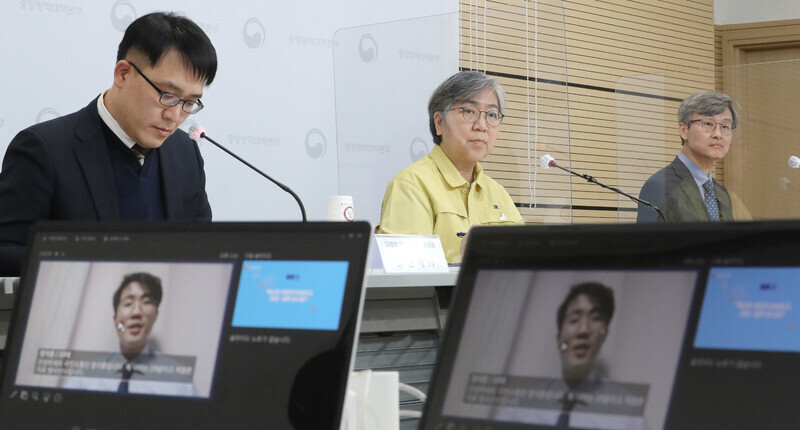hankyoreh
Links to other country sites 다른 나라 사이트 링크
Given uncertainty over COVID-19 vaccines, S. Korea looks into Russian option

While the Pfizer vaccine was supposed to be the first COVID-19 vaccine to be administered in South Korea, the shipment of enough doses for 60,000 people may be delayed past the middle of February.
South Korea’s disease control authorities plan to review various vaccines — including one made by Russia — in order to respond to the possible delay in the vaccine supply and the spread of coronavirus variants.
AstraZeneca, which has contracted with the South Korean government to provide vaccine doses for 10 million people, is supposed to fulfill its first shipment of vaccine, enough to inoculate 750,000 people, on Feb. 24.
Before the Pfizer vaccine can reach South Korea, “a contract first needs to be concluded between Pfizer and the COVAX Facility,” said Jeong Eun-kyeong, commissioner of the Korea Disease Control and Prevention Agency (KDCA), during a press briefing on Feb. 8.
The COVAX Facility is an international body that arranges joint purchases of COVID-19 vaccines.
“After that, the supply schedule might be adjusted a little because of government procedures. Some of the remaining procedures are beyond our control,” Jeong said.
It was initially thought that the supply of Pfizer vaccines that Korea has arranged through the COVAX Facility (117,000 doses, enough for 60,000 people) might arrive as early as mid-February. But Jeong’s comments suggest that the shipment might arrive later than expected, depending on how long it takes Pfizer to conclude contract negotiations with the COVAX Facility and shipping deliberations with the South Korean government.
But the KDCA emphasized that “the COVAX Facility has never officially changed the delivery schedule since it informed the South Korean government last month that [the vaccine] would arrive in mid-February.”
“We need to keep securing more vaccines because of uncertainty surrounding virus variants and delays in the vaccine supply. We’re looking into all vaccine candidates, including the Russian-made Sputnik V,” Jeong said.
Jeong said that Seoul is keeping its options open, though it isn’t currently discussing anything specific with the Russians, such as order size or schedule. Previously, the KDCA had said it wasn’t considering the option of ordering a Russian-made vaccine.
On Feb. 10, a review board at South Korea’s Ministry of Food and Drug Safety will make the final decision about whether to approve the AstraZeneca vaccine. There are questions about the vaccine’s efficacy for the elderly.
“The vaccines will arrive on Feb. 24, and we expect that all preparations will be thoroughly completed prior to that to enable inoculation to commence immediately,” said Prime Minister Chung Sye-kyun during a Q&A session on education, society and culture at the National Assembly.
After his remarks, the KDCA explained that Chung had been referring to the AstraZeneca vaccine.
By Choi Ha-yan, staff reporter
Please direct comments or questions to [english@hani.co.kr]

Editorial・opinion
![[Column] Welcome to the president’s pity party [Column] Welcome to the president’s pity party](https://flexible.img.hani.co.kr/flexible/normal/500/300/imgdb/original/2024/0515/3917157400447943.jpg) [Column] Welcome to the president’s pity party
[Column] Welcome to the president’s pity party![[Editorial] Korea must respond firmly to Japan’s attempt to usurp Line [Editorial] Korea must respond firmly to Japan’s attempt to usurp Line](https://flexible.img.hani.co.kr/flexible/normal/500/300/imgdb/original/2024/0514/2317156736305813.jpg) [Editorial] Korea must respond firmly to Japan’s attempt to usurp Line
[Editorial] Korea must respond firmly to Japan’s attempt to usurp Line- [Editorial] Transfers of prosecutors investigating Korea’s first lady send chilling message
- [Column] Will Seoul’s ties with Moscow really recover on their own?
- [Column] Samsung’s ‘lost decade’ and Lee Jae-yong’s mismatched chopsticks
- [Correspondent’s column] The real reason the US is worried about Chinese ‘overcapacity’
- [Editorial] Yoon’s gesture at communication only highlights his reluctance to change
- [Editorial] Perilous stakes of Trump’s rhetoric around US troop pullout from Korea
- [Guest essay] Preventing Korean Peninsula from becoming front line of new cold war
- [Column] The state is back — but is it in business?
Most viewed articles
- 1[Column] Welcome to the president’s pity party
- 2Could Korea’s Naver lose control of Line to Japan?
- 3Korean opposition decries Line affair as price of Yoon’s ‘degrading’ diplomacy toward Japan
- 4[Editorial] Korea must respond firmly to Japan’s attempt to usurp Line
- 5[Correspondent’s column] The real reason the US is worried about Chinese ‘overcapacity’
- 6[Column] Will Seoul’s ties with Moscow really recover on their own?
- 7US has always pulled troops from Korea unilaterally — is Yoon prepared for it to happen again?
- 8Naver’s union calls for action from government over possible Japanese buyout of Line
- 9[Editorial] Transfers of prosecutors investigating Korea’s first lady send chilling message
- 10Major personnel shuffle reassigns prosecutors leading investigations into Korea’s first lady